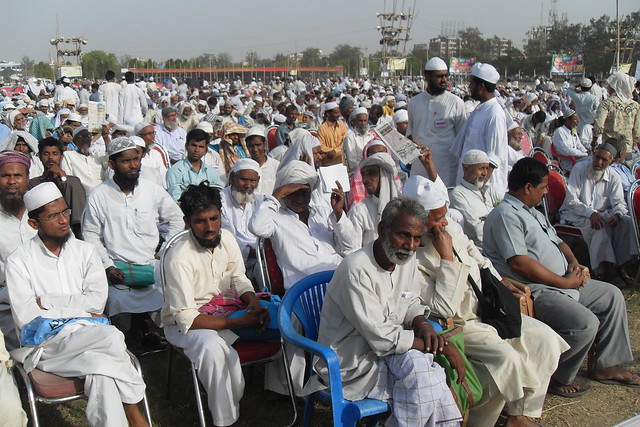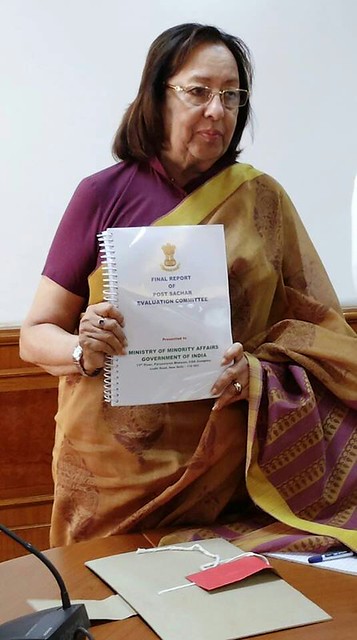By Nivedita Bhardwaj, TwoCircles.net,
New Delhi: Days after reports about the Ministry of Minority Affairs questioning the very basis of Post-Sachar Evaluation Committee, its head Amitabh Kundu said he has not heard formally from the Ministry about it.
However, despite the Ministry’s reported apprehensions, Kundu said he is hopeful his team’s work will not be rejected or marginalised.

The Ministry, as per a report published in Indian Express, has moved an internal document which said the Committee analysed the condition of merely Muslims rather than minorities and, even in that, did an incomplete analysis using outdated data to evaluate effectiveness of the Ministry’s programmes.
“I have not yet heard formally about this from the Ministry. Whatever I have, it is only from the media,” Kundu told TwoCircles.net on Tuesday.
The Post-Sachar Evaluation Committee – popularly known as Kundu Committee – was set up in August 2013 by the UPA government. Its basic aim was to evaluate the socio-economic and educational status of Muslims in wake of the Sachar Committee report of 2006 that pointed out the dire conditions that the members of the community live in. The Kundu Committee was given an extension by the NDA government and finally submitted its report in September 2014.
The Ministry had objected that as against the mandate to look into the Ministry’s programmes – which are not confined to Muslims – the Kundu Committee looked at the status of only Muslims.
Agreeing that he and his team did focus on Muslims, Kundu said, “Sachar Committee report focused on Muslims as Muslims are the most socially vulnerable group. They are 80% plus among all the minorities. Our mandate was to look into post-Sachar issues so we followed that format.”
Reacting to the Ministry’s reported issues about ‘outdated’ data, Kundu admitted that the Committee did not have the latest data set. “When we sought extension, we didn’t quite have the authority to access government data pertaining to 2013-14. We tried as much as we could,” he said.
What the Kundu Committee had was the then latest 2011-12 National Sample Survey (NSSO) statistics. The government had not even released the demographic/religious census figures for 2011 then and hence 2001 Census data was used.
“Despite that, what we predicted about Muslim population growth rate has proved true. The numbers may have increased but the growth rate overall has slowed down,” Kundu said referring to the leaked religious Census 2011 data, which showed that Muslim population rose by 24% between 2001 and 2011 with the community’s share of total population rising from 13.4% to 14.2% over the decade. The growth rate of Muslim population had slowed from around 29% between 1991 and 2001 but was still higher than the national average of 18% for the decade.
“But updating (Committee evaluation) based on latest data would not change major conclusions,” he said. As reported by TCN earlier, diversity index, social audit, clear policy guidelines, better social and physical infrastructure in Muslim concentrated areas, monitoring and evaluation of programmes at regular intervals, similar policy provisions for the persons engaged in similar occupational activities across religious groups and fixed accountabilities on the officers implementing the programmes were some of the major recommendations of the Kundu Committee.
The Ministry’s major objection – or reported point in the internal document – was that the Kundu Committee talked only about Muslims and did not say anything about other minorities.
“It will also be wrong to say that the Committee did not mention other minorities,” Kundu said, adding, “What we did was come out with outcome indicators for which we compared the data about Muslims with other minority communities and also with upper class Hindus.”

Dr. Najma A Heptulla (file photo)
Since the Kundu Committee submitted its report in October 2014, the Ministry has not taken any public stand on whether it accepted or rejected the report. The Ministry has neither had any follow up meetings with either Kundu or any other member of the team.
Allaying fears that the BJP-led NDA government – in view of the fact that the BJP has an perceived anti-minority, especially anti-Muslims image – will not accept the report, Kundu said: “This government is talking about ‘Sabka Saath, Sabka Vikas’. Our report fits in very well with the theme of social inclusion. I don’t think the government will reject our report or marginalise it.”
Recalling how the team was very well received by Najma Heptullah, the Minister for Minority Affairs, when it presented the copy of the report to the Minister, he said: “I am hopeful of positive action.”
Related:
The summary and recommendations of the Post-Sachar Evaluation Committee report or the Kundu Report can be read here
‘Much needed for minority development’: Post-Sachar Committee Report
Muslims as SC, health surveys on religion and background basis: Kundu Comm

